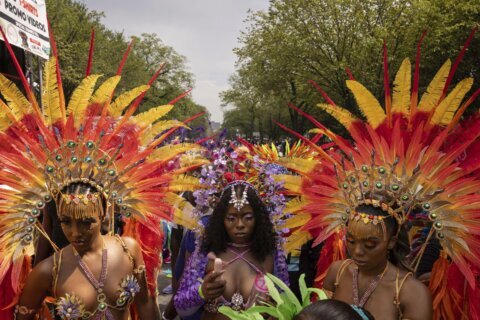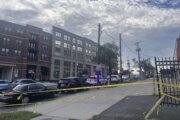COLUMBIA, S.C. (AP) — EDITORS/NEWS DIRECTORS:
As most Americans try to return to normalcy more than three years after the COVID-19 pandemic, emptier pews have become a common reality among many Black Protestant churches across the nation.
Attendance fell 15 percentage points at Black Protestant churches after the COVID outbreak, according to a new Pew Research Center survey. Researchers say “no other religious group has registered a decline of this magnitude.”
A story published Monday by the AP explores the reasons behind the drop at congregations across the U.S., and how parishioners still feel that the Black church remains crucial to the Black community as a source of refuge and hope.
___
READ AP’S STORY
Black Protestant church still vital despite attendance drop
___
SEE THE DATA
The recent Pew survey also found that Black Protestants are the only group in which more than half (54%) still attend services virtually.
Pew defines Black Protestants as those who identify as Protestant (or say they’re “Christian” or “just Christian”) when asked about any religious affiliation they might have, Pew Research Associate Michael Rotolo says.
___
FIND YOUR LOCAL BLACK PROTESTANT CHURCH
Two-thirds of Black Americans are Protestant, surveys show. But patterns of worship are shifting across generations: younger Black adults attend church less often than their elders, and those who attend are less likely to do so in a predominantly Black congregation.
Here is a list of major historically Black Protestant denominations and their foundation dates ( from Pew ):
— African Methodist Episcopal (AME) Church, 1816
— African Methodist Episcopal Zion (AME Zion) Church, 1821
— Christian Methodist Episcopal (CME) Church, 1870
— National Baptist Convention, USA Inc., 1880
— Church of God in Christ (COGIC), 1897
— National Baptist Convention of America International Inc., 1915
— Progressive National Baptist Convention Inc.. 1961
— Full Gospel Baptist Church Fellowship International, 1994
___
PUBLISH THIS CONTEXT
Attendance had been declining at Black Protestant churches for decades. But researchers and academics say it has only been accelerated by a devastating COVID-19 pandemic that infected and killed Black Americans at a disproportionate rate.
A history of systemic racism and inequity in access to health care as well as a lack of economic opportunity has made many Black Americans far more vulnerable to the virus. Black adults suffer from higher rates of obesity, diabetes and asthma, making them more susceptible. They are also more likely to be uninsured. (For context, see this comprehensive story by the AP’s race & ethnicity team ).
During the pandemic, they were also been more likely to have jobs deemed essential, less able to work from home and more likely to live in crowded, multigenerational households, where working family members were apt to expose others to the virus. Church leaders say all of this makes some hesitant about returning to church in person.
___
ASK THESE QUESTIONS
— Interview church leaders, congregants, Sunday school teachers and seek out young people as well as elderly congregants. Ask what changes they’ve experienced related to church attendance trends, choir participation, size of their church volunteer pool and more. Did the pandemic cause or exacerbate these changes?
— At this stage of the COVID-19 outbreak, what are the challenges and opportunities for Black congregations attending virtually and in-person? Ask local pastors what they’ve learned about ministering during a pandemic — and how they’re reaching out to congregants through technology? (including social media, livestreams and digital content).
— Ask congregants how their church attendance habits have evolved since the pandemic outbreak.
— Many pastors, parishioners and academics agree that Black churches remain fundamental to the Black community, providing refuge and hope, especially during times of challenge. Ask pastors how they were involved with their community to fight vaccine hesitancy.
— Ask church members if they’re facing more physical and mental health challenges or new personal responsibilities that affect their ability to attend services in person.
— Seek out academics and others who are established experts on Black Protestant history, ministry, theology, church life and more for important context to add to the story.
___
FIND MORE DATA
___
VIEW ADDITIONAL RESOURCES
A brief history of the Black church’s diversity, and its vital role in American political history
Black religious affiliation and congregations
“Reimagining a Post-Covid-19 Black Church: Lessons, Opportunities, and Possibilities” — lecture by Trina Armstrong.
The Black Church ( series and book by Henry Louis Gates Jr. )
The Black Church in the African American Experience
___
READ MORE AP COVERAGE
Survey: Black Americans attend church and pray more often
Black community has new option for health care: The church
Outcry over racial data grows as virus slams black Americans
Find AP’s latest global religion coverage here.
___
Localize It is an occasional feature produced by The Associated Press for its customers’ use. Questions can be directed to Katie Oyan at koyan@ap.org.
___
Associated Press religion coverage receives support through the AP’s collaboration with The Conversation US, with funding from Lilly Endowment Inc. The AP is solely responsible for this content.
Copyright © 2024 The Associated Press. All rights reserved. This material may not be published, broadcast, written or redistributed.







